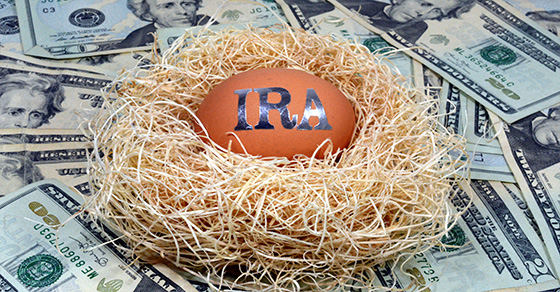Weekly Tax Brief
Tax responsibilities if your business is closing amid the pandemic
- Details
- Published: 20 November 2020 20 November 2020

Unfortunately, COVID-19 has forced many businesses to shut down. If this is your situation, we’re here to assist you in any way we can, including taking care of various tax obligations. A business must file a final income tax return and some other related forms for the year it closes. If you have employees, you must pay them final wages and compensation owed, make final federal tax deposits and report employment taxes. Failure to withhold or deposit employee income, Social Security and Medicare taxes can result in personal liability for what’s known as the Trust Fund Recovery Penalty. There may be other responsibilities. Contact us to discuss these issues and to get answers to any questions.
Read more: Tax responsibilities if your business is closing amid the pandemic
Taking distributions from a traditional IRA
- Details
- Published: 17 November 2020 17 November 2020

If you’ve built a nice nest egg in a traditional IRA (including a SEP or SIMPLE-IRA), it’s critical that you plan carefully for withdrawals from these tax-deferred retirement vehicles. For example, if you need to take money out of a traditional IRA before age 59½, distributions will generally be taxed and may also be subject to a 10% penalty. However, there are several ways to avoid the penalty (but not the regular income tax). Once you attain age 72, traditional IRA withdrawals must generally begin or you’ll be penalized. However, the CARES Act suspended the required minimum distribution rules for 2020. Contact us with traditional IRA questions and to analyze your retirement planning.
How Series EE savings bonds are taxed
- Details
- Published: 10 November 2020 10 November 2020

Many people have Series EE savings bonds that were purchased many years ago. Perhaps they were given as gifts or maybe you bought them yourself and filed them away. You may wonder: How is the interest taxed? EE bonds don’t pay interest currently. Instead, accrued interest is reflected in their redemption value. (But owners can elect to have interest taxed annually.) EE bond interest isn’t subject to state income tax. And using the money for higher education may keep you from paying federal income tax on it. Unfortunately, the law doesn’t allow for the tax-free buildup of interest to continue forever. When the bonds reach final maturity, they stop earning interest. Contact us with questions.
Divorcing couples should understand these 4 tax issues
- Details
- Published: 28 October 2020 28 October 2020

When a couple is going through a divorce, taxes are probably not foremost on their minds. But without proper planning, some people find divorce to be even more taxing. Several concerns should be addressed to ensure that taxes are kept to a minimum. For example, if you sell your principal residence or one spouse remains living there while the other moves out, you want to make sure you’ll be able to avoid tax on up to $500,000 of gain. You also must decide how to file your return for the year (single, married filing jointly, married filing separately or head of household). There are other issues you may have to deal with. We can help you work through them.
Read more: Divorcing couples should understand these 4 tax issues
The 2021 “Social Security wage base” is increasing
- Details
- Published: 23 October 2020 23 October 2020

If your small business is planning for payroll next year, be aware that the “Social Security wage base” is increasing. The Social Security Administration recently announced that the maximum earnings subject to Social Security tax will increase from $137,700 in 2020 to $142,800 in 2021. Wages and self-employment income above this threshold aren’t subject to Social Security tax. For 2021, an employer must withhold: 6.2% Social Security tax on the first $142,800 of employee wages, plus 1.45% Medicare tax. In addition, there’s a 0.9% additional Medicare tax on all employee wages in excess of $200,000. Contact us with questions. We can keep you in compliance with payroll laws and regulations.
Read more: The 2021 “Social Security wage base” is increasing
Buying and selling mutual fund shares: Avoid these tax pitfalls
- Details
- Published: 21 October 2020 21 October 2020

If you invest in mutual funds, there are potential pitfalls involved in buying and selling shares. For example, you may already have made taxable “sales” of part of your mutual fund without knowing it. One way this can happen is if your mutual fund allows you to write checks against your fund investment. If you write a check against your mutual fund account, you’ve made a partial sale of your interest in the fund (except for funds such as money market funds, for which share value remains constant). Thus, you may have taxable gain (or a deductible loss) when you write a check. And each such sale is a separate transaction that must be reported on your tax return. Contact us with questions.
Read more: Buying and selling mutual fund shares: Avoid these tax pitfalls
Understanding the passive activity loss rules
- Details
- Published: 16 October 2020 16 October 2020

The passive activity loss rules affect business ventures you’re engaged in or might engage in. If the ventures are passive activities, the passive activity loss rules prevent you from deducting expenses that are generated by them in excess of their income. You can’t deduct the excess expenses (losses) against earned income or against other non-passive income. Non-passive income for this purpose includes interest, dividends, annuities, royalties, gains and losses from most property dispositions, and income from certain oil and gas property interests. There are different rules for rental activities. Contact us if you’d like to discuss how these rules apply to your business.
The tax rules for deducting the computer software costs of your business
- Details
- Published: 09 October 2020 09 October 2020

Do you buy or lease computer software to use in your business? Do you develop software for use in your business, or for sale or lease to others? You should be aware there are complex rules that may apply to determine the tax treatment of the expenses. The rules depend on whether the software is purchased, leased or developed by your business. For example, you must deduct amounts you pay to rent leased software in the tax year they’re paid, if you’re a cash-method taxpayer, or the tax year for which the rentals are accrued, if you’re an accrual-method taxpayer. We can assist you in applying the tax rules for treating computer software costs in the way that is most advantageous for you.
Read more: The tax rules for deducting the computer software costs of your business
The tax rules for deducting the computer software costs of your business
- Details
- Published: 02 October 2020 02 October 2020

Do you buy or lease computer software to use in your business? Do you develop software for use in your business, or for sale or lease to others? You should be aware there are complex rules that may apply to determine the tax treatment of the expenses. The rules depend on whether the software is purchased, leased or developed by your business. For example, you must deduct amounts you pay to rent leased software in the tax year they’re paid, if you’re a cash-method taxpayer, or the tax year for which the rentals are accrued, if you’re an accrual-method taxpayer. We can assist you in applying the tax rules for treating computer software costs in the way that is most advantageous for you.
Read more: The tax rules for deducting the computer software costs of your business
Can investors who manage their own portfolios deduct related expenses?
- Details
- Published: 23 September 2020 23 September 2020

In some cases, investors have related expenses, such as the cost of subscriptions to financial periodicals and clerical expenses. Are they tax deductible? Currently, they’re only deductible if you can show that your investment activities rise to the level of carrying on a trade or business. In that case, you may be considered a trader, rather than an investor. A trader is entitled to deduct investment-related expenses as business expenses. A trader is also entitled to deduct home-office expenses if the home office is used exclusively on a regular basis as the trader’s principal place of business. However, be aware that trader status is difficult to achieve. Contact us with questions.
Read more: Can investors who manage their own portfolios deduct related expenses?





